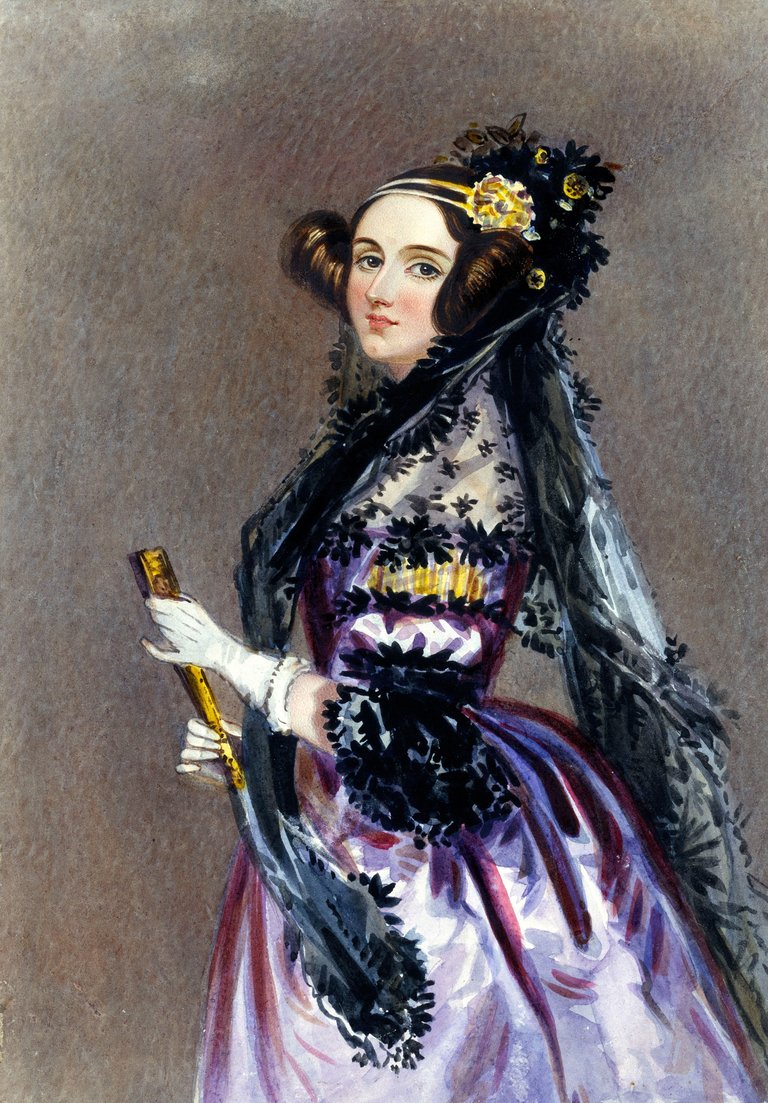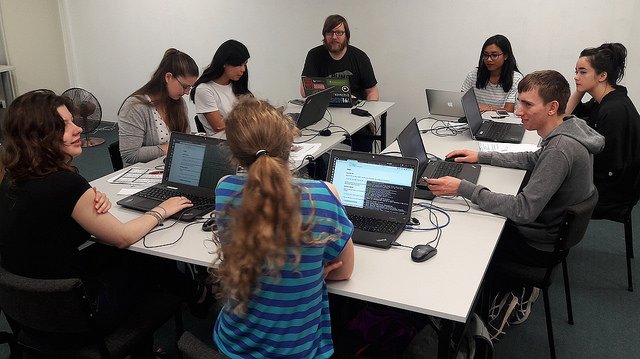I have something to say about Feminism. And this is gonna be lengthy, so please stay with me.
I want to start by saying that I wasn't always a feminist. I was that person in high school that didn't really know what it was but knew all the negative connotations that came with it, so I didn't want to identify with it.
I think I need to give a bit of backstory. For those who don't know me, I work as a developer and study Computer Science and Commerce at university. Having a career in tech seemed to be a path I've been on since primary school, and I'm really happy with that path and I'm loving it and have learned and achieved so much. However, as I've gotten older, I find I'm usually surrounded by people who are also studying or working in STEM (Science, Tech, Engineering, Maths) areas. When I say people, I mean males.
I had great Digital Technologies teachers in high school who constantly stressed to us how high of a demand there was for women in tech. Obviously I didn't see this because everyone around me was a girl at a single-sex school. I think it really hit me the hardest when I started studying and felt completely out of place and a little isolated in my lectures. I'm doing two degrees which gives me the opportunity to see the diversity of the people studying each. I'll walk into a lecture for my Science degree and see a sea of boys, whereas my Commerce classes are all much more balanced. Maybe I had been taught to notice it, but it's not hard to notice when you walk into a room and no one looks like you.
Time for a bit of a history lesson. Women weren't always so rare in tech. When computing was emerging in the 1940s, software programming was considered unglamorous and almost secretarial - therefore ideal for a woman. Men weren't interested in software and coding until its potential for profitability was revealed, and then they flooded in and essentially turned the industry into a bit of a boys club. I know that tech being a guy's thing is kind of the norm at this point, but what you may not know is that the person who was recognised as the first computer programmer was a woman named Ada Lovelace. Later, the inventor of the first compiler was another woman named Grace Hopper. So, if women were so influential and such icons in tech at the very start, where are they now?

Ada Lovelace

Grace Hopper
This may have been when I became more interested in feminism. I started noticing how few women there are in areas that were becoming important to me - in my lectures and classes, in managerial and board positions, in politics. And it made absolutely no sense to me! I remember people asking what I was studying and being completely shocked when I'd say computer science - "Oh you must be so smart then!" or, "You don't look like a programmer?" Sure, I'm not a dude but do you realise that when you react like that, it sounds like you expected less of me or believe I'm in the wrong place? Because I'm a girl?
It became really important to me to get more women into IT because it's been proven that diverse groups of people, with diverse ideas, experiences & skills, produce better products. Also, I was sick of being met with shock when people learned that I spend most of my days coding. Also, why the heck shouldn't women be in STEM areas when they're just as capable as men?
In the past year or so I've put myself out there a lot more in the hopes of meeting more women in tech. You'd be surprised at how easy it was, because there are SO many. The thing I noticed about every proud woman in tech that I met is that we all want more women around us. This was so refreshing and caused me to be even more driven, but on top of that, it made me realise that the main problem wasn't a lack of women. Firstly, the tech industry is not an environment that is friendly to women. Secondly, we aren't teaching our young girls to aspire to have careers in STEM areas. Everything STEM was catered to boys, from when they're young and in primary school to when they're working. And these things and more made me mad. So I ended up calling myself a feminist and that's how we got here.

Mentoring at an Open Source Academy for high school students
So what is feminism? It's important to understand that, yes, feminism is about wanting economic, social, political equality for the sexes. But we can't ignore the part that recognises that women are starting from a lower place than men. Women of colour, trans and non-straight people start from even lower.
No one blames men or hates them for having male privilege - it's something they were born with. But it's something that men should be aware of. You can't just say you don't 'see' gender, because you're then disregarding a very large part of a person's identity. We ask men to recognise their male privilege and use it to bring women into their spotlight. Not to give it to them, but to share it with them. Because generally, men have a larger spotlight, with more funding, contacts and support. And many more dudes.
I think men aren't aware of how feminism can benefit them, because apparently many people think we already have equality.
Here is a very incomplete list of inequalities that affect me or people around me:
- Paternal leave isn't really a thing, because women are still expected to take the role of mother and keeper of house. This is bad for men, because they lose that crucial time to bond with their baby and are pressured to return to work and continue to hold the role of the bread maker.
- Women are not considered physically strong or tough, which is why in the past, men were the ones sent away to war and women were told to stay at home with the children. See point above.
- Women are allowed (and expected) to be emotional, while men aren't allowed to be. Obviously this is problematic because, while men have been taught to suppress their feelings, women feel like they must suppress their feelings to be taken seriously.
- Women have to pay tax on menstrual products. On a product that a man will never have to use. Surely it's obvious why this is unfair.
- Something a little closer to home: men make up 79% of NZ's tech workforce, and tend to have higher salaries than women.
- Arts, music, fashion etc are considered feminine while STEM areas are considered masculine.
- Magazines that are made for boys have science and sports on the cover while magazines made for girls have celebrity boy crushes and 'how to dress for your body type' on the cover.
I could go on, but this is quite the novel at this point.
I'm going to wrap it up by saying that being a feminist means that you want more for women so that we are given equal opportunity and support to men. Being a woman in tech (sorry for the ridiculously long backstory but it felt helpful) is what showed me that we aren't in that place yet. If you still aren't ready to call yourself a feminist, that's okay, but please do your own research. This is just my point of view, and I don't have all the answers yet, but I now know what the future that I want looks like. And I'm gonna keep working towards it. Till next time!
Just made the mistake of browsing the feminism tag on Steemit. Yours was the only article that was interesting and relevant - so thanks. Otherwise, it seems like kind of a steeming pit of bro culture around here. "Look I re-tweeted something the WaPo tweeted! Women are dumb!!"
Hey there - so glad what I wrote could be refreshing in what sounds like a very unwelcoming environment! The bro culture is SO real
Congratulations @aleisha! You have completed some achievement on Steemit and have been rewarded with new badge(s) :
Click on any badge to view your own Board of Honor on SteemitBoard.
For more information about SteemitBoard, click here
If you no longer want to receive notifications, reply to this comment with the word
STOPWow that's really cool, didn't know about this. Thanks!
Nice post, I totally understand the problem being in tech and would be happy if things getting more equal and attractive for women. We (men) would profit definitely from it.
By the way I'm a member of OCD, please read below:
This gem of a post was discovered by the OCD Team!
Reply to this comment if you accept, and are willing to let us promote your gem of a post! By accepting this, you have a chance to receive extra rewards and one of your photos in this article will be used on our compilation post!
You can follow @ocd – learn more about the project and see other Gems! We strive for transparency.
Thanks for your comment! Will check out your page and your posts :)
If you want to be considered for ocd please reply to my request..
Sorry, where is your request?
"Women have to pay tax on menstrual products." How about hair products? cosmetics? bras (high heels, elaborate dresses etc.)? You can't expect to be taken seriously with that kind of silly argument(s). All except the magazines part. There should be tech magazines for girls, obviously. Does gender makes developing code easier for boys? Like, with the snap of a finger a boy can have a 100(0+) lines of well-written and documented code? Equality = equal responsibility, and not just being a woman in tech making you special
You sound very defensive about this, and yes I do expect to be taken seriously. What about hair products and cosmetics? Why is the menstrual product tax a silly argument? Women have to pay tax on a necessity item, and men do not experience that burden. I think it's a fair argument, seeing as I am a woman and have to pay that tax. I guess you're annoyed about me making this point because you can't relate to it. Also, you can't equate menstrual products to high heels - YOU can't expect to be taken seriously with that kind of silly argument.
I'm wondering where you read in my writing that women should be automatically accepted into tech just for being women? I said the industry isn't welcoming to women. Perhaps you think gender inequality isn't a problem because it isn't your experience to be treated differently based on an unconscious bias about your gender, but that doesn't mean that you should minimise my experience, or the experience of other women in tech.